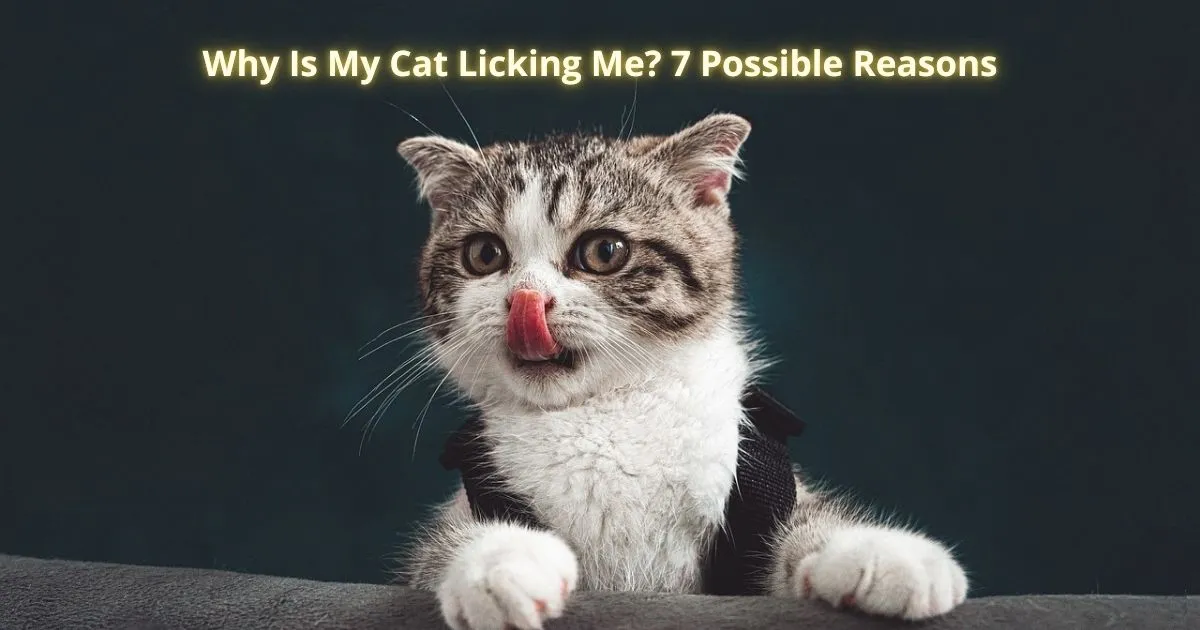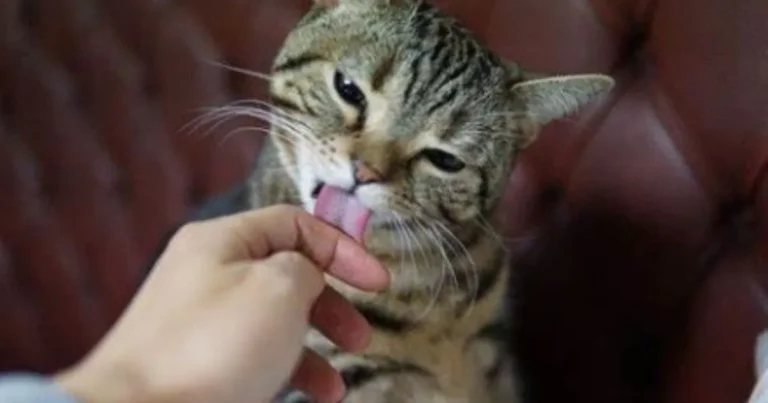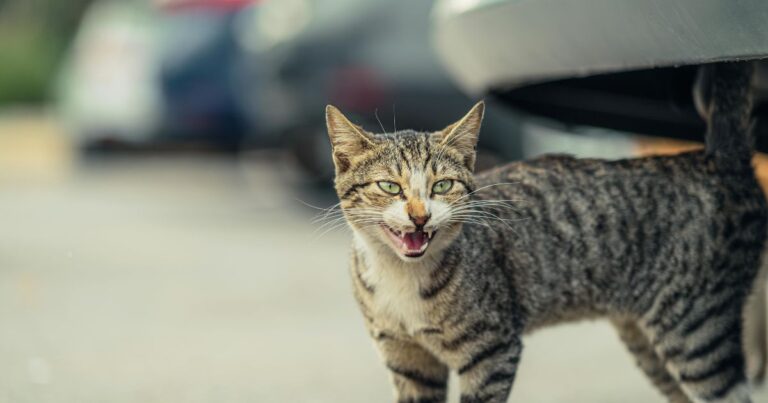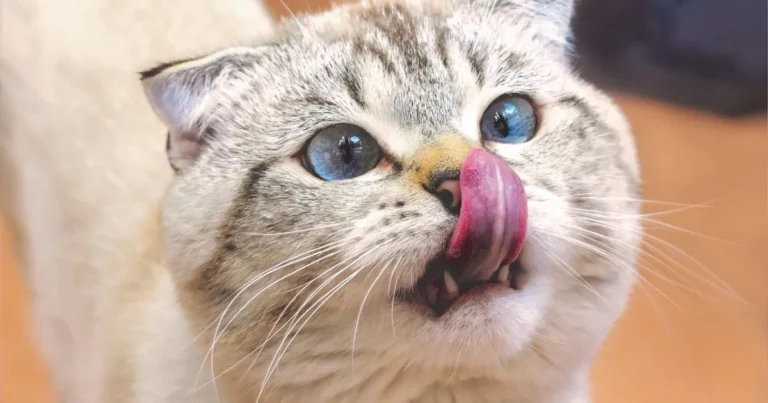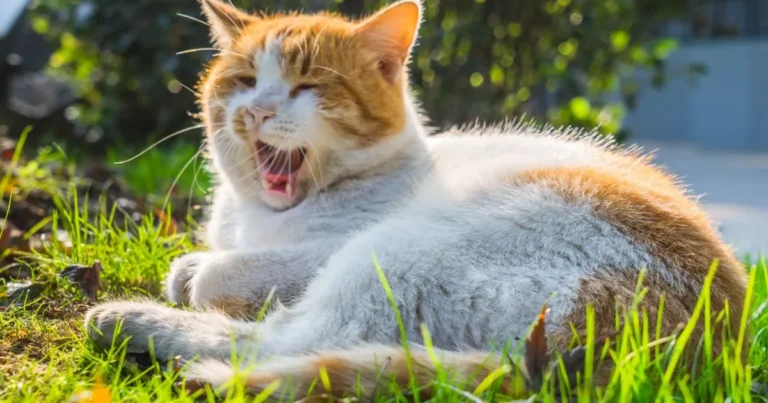Why Is My Cat Licking Me? 7 Possible Reasons
Table of Contents
Why Is My Cat Licking Me?
Every cat owner has had that surprise moment when their cat starts licking them. You might ask, “Why is my cat licking me?” This behavior is more than just a simple act. It shows a lot about your cat’s feelings and how they see you.
Cats have their own special ways to talk to us. Their tongues, with tiny hooks, do more than just clean themselves. When they lick you, they’re sending a message that’s deeper than just a touch.
Knowing why cats lick can help you understand them better. It can even make your bond stronger. Each lick can tell you about your cat’s feelings and what they need. This article will look at seven interesting reasons for this special behavior.
Whether you’re new to cat ownership or have been a pet parent for years, learning about cat communication is key. It can change how you connect with your cat. Let’s explore the world of cat licking and discover the secrets behind it.
Understanding Cat Licking Behavior
Cat grooming is more than just keeping clean. It’s a complex behavior that shows their natural instincts. When you ask why your cat licks you, it’s a sign of their communication.
The Unique Science of Feline Tongue Anatomy
A cat’s tongue is special. It has tiny, backward-facing barbs called papillae. These act like a brush, helping cats:
- Remove dirt and debris from fur
- Distribute natural oils across their coat
- Regulate body temperature
- Stimulate blood circulation
Grooming Time and Frequency
Cats spend a lot of time grooming. They usually groom for two to five hours a day. This is crucial for their health.
Natural Grooming Instincts
Grooming is a survival instinct for cats. It helps them stay hidden from predators. This behavior also shows affection and bonding with their owners.
Showing Affection Through Licking
When your cat starts licking you, it’s more than just grooming. Cat affection is deep, and licking shows love in a special way. Understanding why your cat licks you can open their emotional world.
Cats learn to show love through licking early on. As kittens, they bond with their mother and siblings through licking. This early experience becomes a powerful way to show love to humans too.
- Licking is a sign of trust and emotional connection
- Your cat sees you as part of their social group
- This behavior mimics how cats show care in the wild
When your cat licks you, they’re saying “you’re family.” Just like in the wild, they groom to bond. It’s their way of claiming you, showing comfort, and deep affection.
Your cat’s gentle licks are a heartwarming reminder of the unique bond you share.
Each lick is a tiny declaration of love from your cat. By recognizing and appreciating these moments, you strengthen your bond with your cat.
Why Is My Cat Licking Me: Social Bonding Explained
Cat communication is more than just meows and purrs. Licking shows deep emotional bonds between cats and their humans. It’s a way for your cat to express their feelings in a special way.
Origins in Maternal Care
Cat licking behavior comes from their kitten days. Mother cats groom their kittens to bond and care for them. This instinct is about cleaning, comfort, teaching, and family ties.
- Cleaning and hygiene maintenance
- Providing comfort and security
- Teaching social skills
- Establishing familial connections
Creating Emotional Connections
When your cat licks you, they see you as family. Allogrooming is how cats show trust and love. It’s their way of saying “you belong with me.”
Social Grooming Patterns
Cats have complex ways of bonding through licking. In groups, they groom each other to:
- Reduce tension
- Establish hierarchy
- Show mutual respect
- Strengthen group cohesion
This behavior also shows in their interactions with humans. Each lick is a sign of connection.
Marking Territory and Ownership
Cat communication is more than just meows and purrs. Licking is a way for your cat to claim you as their own. It’s not just affection; it’s a sign of ownership.
Cats have scent glands all over their bodies. By licking you, they spread their scent. This tells other animals: you are part of their territory. It’s a natural instinct for them.
- Licking transfers your cat’s unique scent onto you
- Territorial marking helps cats feel secure in their environment
- This behavior signals ownership to other animals
Why does your cat lick you so much? It’s their way of showing you belong to them. They see you as family and want to protect you.
Different ways cats mark territory include:
- Cheek rubbing against you
- Scratching specific areas
- Spraying subtle scent markers
- Persistent licking
Understanding these behaviors shows how complex your cat’s world is. Each lick is a way for them to communicate, rooted in their history.
Attention-Seeking Behavior
Cats are experts at getting what they want, and licking is a key way they do it. They lick to get your attention and tell you what they need.
Figuring out why your cat licks you can tell you a lot. Cats are smart and learn fast. They know which actions get a reaction from people.
Communication Through Licking
Licking is a clever way for cats to talk to us. Here are some ways they use licking to get attention:
- Requesting food or treats
- Wanting playtime or interaction
- Seeking physical affection
- Signaling discomfort or stress
Signs Your Cat Wants Something
To spot attention-seeking licking, look for certain signs. Cats often use licking with other actions to get their point across.
| Licking Behavior | Potential Meaning |
|---|---|
| Persistent licking on hands | Likely hungry or wanting food |
| Licking followed by meowing | Requesting immediate attention |
| Gentle, rhythmic licking | Seeking comfort or emotional connection |
Watch your cat’s body language and when they lick. Context is key to understanding their message.
Stress and Anxiety Relief
Cats often lick themselves or others as a way to cope with stress. When they’re feeling anxious, they might lick you or themselves. This is like how humans might bite their nails or fidget when they’re nervous.
Understanding why your cat licks you during stressful times can help you support them better. Cats get stressed from many things, like:
- Sudden environmental changes
- New pets or family members
- Loud noises
- Disrupted routines
- Lack of personal space
Licking is a calming way for cats to release endorphins and lower their anxiety. When your cat licks you, they might be looking for comfort and trying to manage their emotions.
| Stress Trigger | Potential Licking Response |
|---|---|
| Moving to a new home | Increased self-grooming or owner licking |
| Construction noise | Compulsive licking behaviors |
| Introduction of new pet | Excessive licking as comfort mechanism |
If your cat is licking a lot due to stress, try to make their environment calmer. Provide safe spaces, keep routines consistent, and interact gently. This can help your cat feel more secure.
“Cats communicate complex emotions through seemingly simple behaviors like licking.” – Veterinary Behavioral Specialist
Comfort-Seeking Behavior
Cat grooming shows deep emotional needs, especially for comfort. Your cat’s licking might be more than just a simple action. It could be a complex response to stress, anxiety, or past experiences.
Cats develop unique coping mechanisms when they face big changes or early separation from their mother. Licking becomes a key way for them to self-soothe and find emotional security.
Impact of Environmental Changes
Cats are sensitive and can get stressed by small changes. These shifts can make them lick as a way to manage their feelings.
- Moving to a new home
- Introduction of new pets
- Changes in family dynamics
- Alterations in daily routines
Early Separation Consequences
Kittens separated too early from their mothers may face long-term stress. These cats often lick as a comfort, trying to recreate the nurturing they missed.
| Separation Age | Potential Behavioral Impact |
|---|---|
| Before 8 weeks | High risk of anxiety-related behaviors |
| 8-12 weeks | Moderate potential for stress responses |
| 12+ weeks | Lower likelihood of significant behavioral issues |
Understanding these patterns helps you provide better emotional support for your feline companion.
Taste and Sensory Exploration
Cats have a unique sense of taste that goes beyond just liking treats. When they lick you, they might be exploring their surroundings in a special way. This shows their curious side and how they communicate.
Your skin can offer many interesting flavors to your cat. They might taste the salt from your sweat, leftover food, or your unique scent. This helps them understand and interact with their world.
- Salty skin from perspiration
- Food residues on hands or arms
- Unique personal scent markers
Understanding why your cat licks you means seeing their complex sensory world. Cats have about 470 taste buds, compared to humans’ 9,000. But their sense of taste is closely linked to their sense of smell.
| Sensory Exploration Trigger | Potential Reason for Licking |
|---|---|
| Salty Sweat | Mineral interest and taste investigation |
| Food Residue | Direct taste attraction |
| Unique Body Odor | Scent and flavor recognition |
Your cat’s licking is not just random. It’s a smart way for them to learn about their environment and the people they care about.
Warning Signs of Excessive Licking
Cat owners often wonder about their pet’s licking behaviors. While occasional licking is normal, compulsive licking can signal underlying health concerns that require careful attention.
Recognizing Problematic Licking Patterns
Understanding the difference between normal grooming and excessive licking is crucial. Cats may develop compulsive licking habits that point to potential medical issues or emotional distress.
- Persistent licking of specific body areas
- Visible skin irritation or hair loss
- Changes in skin condition or coat quality
- Unexplained behavioral shifts
Medical Concerns to Investigate
Several health conditions can trigger excessive licking, including nutritional deficiency and underlying skin conditions. Veterinarians recommend watching for these specific warning signs:
| Potential Cause | Observable Symptoms |
|---|---|
| Skin Infections | Redness, swelling, unusual odor |
| Nutritional Deficiency | Dull coat, weight loss, decreased appetite |
| Allergic Reactions | Constant scratching, bumpy skin texture |
When to Consult a Veterinarian
If your cat’s licking becomes obsessive or you notice significant changes in their skin or behavior, scheduling a professional veterinary consultation is essential. Early detection can prevent more serious health complications.
“Persistent licking is your cat’s way of communicating potential health issues. Listen carefully to their silent signals.” – Veterinary Dermatology Association
How to Respond to Cat Licking
Understanding cat communication is key to handling their licking. If your cat licks you too much, it’s important to keep your bond strong. But, you also need to set clear boundaries.
Here are some practical strategies for addressing why is my cat licking me:
- Redirect your cat’s attention with interactive toys
- Offer gentle physical affection like petting or cuddling
- Create a stimulating environment to reduce stress-related licking
- Use positive reinforcement techniques
If the licking is too much, gently move away. This shows your cat that the behavior isn’t okay without upsetting them. Remember, cats use licking as a primary form of communication. So, be patient and understanding in your response.
Professional vets suggest setting clear boundaries. When your cat starts licking, try:
- Speaking softly to distract them
- Providing alternative activities
- Rewarding calm, non-licking behavior
Watch for signs of anxiety, boredom, or a need for attention. Understanding your cat’s emotional needs helps build a better relationship.
Every cat is different, so try various methods to see what works for yours. Being patient and consistent is crucial in managing cat licking behavior.
Conclusion
Understanding why your cat licks you is key. It shows their emotional state and needs. Each lick tells a story about their feelings and bond with you.
A gentle lick might mean they love you deeply. But, if they lick too much, it could mean they’re stressed or want your attention. Cat licking is a complex way of communicating.
To connect better with your cat, watch their body language and when they lick you. Each moment is a chance to understand them better. By noticing their signals, you can strengthen your bond.
Cat licking is more than just a gesture. It shows the complexity of their social interactions. Seeing these moments as a way to connect with your cat can deepen your relationship.

